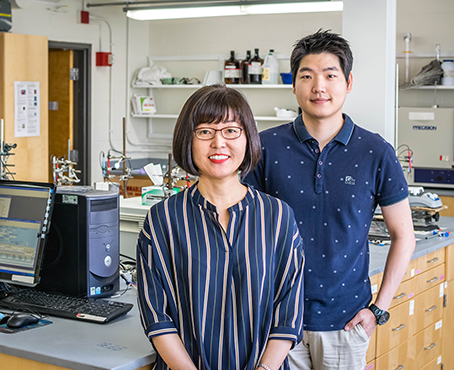
The worth of water
Desalination ‘battery’ could slake a thirsty world
The data is startling: approximately 2/3 of the world must survive without ready access to fresh water at some point this year.
In her office on the UW-Madison campus – a mere stone’s throw from Lake Mendota – the global water crisis may seem far away. But Kyoung-Shin Choi pulls up a world map on her computer indicating the regions that lack access.
From Sydney to Sedona it’s splotched with ominous shades of red, indicating serious water scarcity.
“Four billion people live without sufficient access to fresh water for at least one month of the year,” she says.
The situation is even more distressing in large swaths of North Africa, the Middle East and Central America, where 500 million people face severe water scarcity all year round.
Like many others, Choi, a professor of chemistry, is looking to the sea for a solution. Since the oceans account for more than 96 percent of Earth’s water, desalination may be the best answer.
But cost is key. The simplest method of desalinating water, distillation, requires lavish amounts of energy.
“You have to boil the sea,” Choi says. “That’s not cheap.”
The other established method used in industrialized countries is reverse osmosis (RO). In RO, seawater is pumped through a membrane to remove the salt ions. But running the high-pressure pump gulps electricity. Another drawback is that the water must be pretreated with various chemicals to prevent fouling of the membrane.
Choi and her collaborator, Do-Hwan Nam, are taking a different tack entirely.
“If you develop a technology that manipulates water and salt and energy in a different manner you can find a new market,” Choi says.
With support from the WARF Accelerator Program they are developing a rechargeable desalination cell capable of turning seawater into fresh water.
The crux of the invention: a chloride storage electrode made from nanocrystalline bismuth foam.
Bismuth is significantly less expensive than other designs recently developed that rely on silver, Choi explains.
It works like this: the bismuth-based chloride-storage electrode is coupled to a sodium-storage electrode to form a battery. The battery captures salt ions in the bulk of the electrodes, which requires an energy input and is equivalent to a charging process. The device is then moved into a wastewater brine solution where it releases the salt, which generates an energy output and is equivalent to a discharging process.
The process results in a continuous discharging (desalination)/charging (salination) cycle that requires a net potential input of only 0.20 V.
There’s more. The bismuth electrodes can be used for other chloride-removal applications. For example, treating industrial wastewater that contains hydrochloric acid.
Their prototype is energy efficient and practical. But now that the concept has been successfully demonstrated at benchtop scale, Choi wants to take the next step. She wants to improve the capacity, rate and cyclability of the batteries.
“Providing water to all the people in a town requires a lot of desalination,” she says. “In order to use our technology in a large scale there are things that need to be improved and enhanced.”
“Accelerator funding will allow us to further optimize the system.”
This project is an interesting pivot for Choi, whose work has up until now focused on biomass conversion using aqueous electrochemistry and solar-driven hydrogen production by water reduction.
“My research has always involved water in some way,” she says. “And I have always known that cleaning water is a critical issue as important as energy.”
A self-described pragmatist, Choi values the industry feedback she has received from the program’s Catalysts and always strives for perspective.
“I tell my students that life is short. You have to focus on things that you believe are important,” she says. “During my life I want to tackle something that has a direct impact on everyday life.”